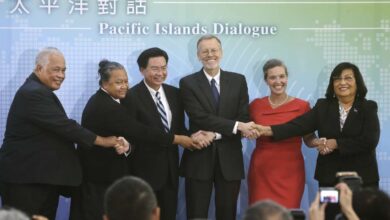Turkey: Erdogan suffers setback as opposition wins significant ground in local polls
With significant victories in Sunday’s municipal elections, President Recep Tayyip Erdogan suffered a serious blow. Preliminary results indicate that Erdogan’s hopes of regaining control over Turkey’s major metropolitan areas were thwarted as the Republican People’s Party (CHP) made significant gains elsewhere while maintaining power over important cities.

Turkey’s biggest city and economic hub, Istanbul, saw incumbent Mayor Ekrem Imamoglu of the CHP lead the vote, according to The Washington Post, which cited official broadcaster TRT. Preliminary results indicate that Mansur Yavas, the current mayor of Ankara, secured victory with a significant lead, with over 60% of vote boxes having been counted so far.
With the goal of regaining territory that the opposition lost in the last election five years ago, Sunday’s election contest was seen as a gauge of President Erdogan’s popularity. The CHP’s prior wins in 2019 in Ankara and Istanbul had pierced Erdogan’s sense of unstoppability.
“A new system of politics”
The centre of the election campaign was Istanbul, a metropolis of 16 million inhabitants. Erdogan started his political career as mayor of the Turkish capital in 1994.
The results of Sunday’s election demonstrated the electorate’s yearning for change and gave the opposition, which had struggled with disunity and demoralisation after last year’s political setbacks, a significant boost.
“To a jubilant crowd of supporters, the voters decided to establish a new political order in Turkey,” said CHP leader Ozgur Ozel. “Today’s voters in Turkey chose to usher in a new political era and alter the country’s 22-year-old image.”
Yavas’ overwhelming win was celebrated in Ankara, where cheering supporters gathered outside City Hall and sang, “Ankara is proud of you!”
Unrest in the economy and disenchanted voters
“The surprising outcome,” according to Sinan Ulgen, head of the Edam think tank in Istanbul, was that voters wanted to hold the governing party accountable for the severity of the country’s economic crisis. Many Turkish families can no longer afford basic necessities due to rising inflationary pressures.
“In comparison to previous elections, turnout was comparatively low,” he said. Because of deeper ideological ties, there were cross-party movements in the vote that did not occur in the national elections. In this period, identity was subordinated to economics.
A little over 61 million people, including more than a million newly eligible voters, may cast ballots in the elections for town and district mayorships, metropolitan municipalities, and neighbourhood administrations.
sporadic violence with a typical attendance
The state-run Anadolu Agency was cited in a Washington Post story that said that turnout was at 76%, which was lower than the 87% reported the year before.
Even with 5,94,000 security officers stationed all throughout the country, the generally calm election process was tainted by occasional occurrences.
A fight in Diyarbakir over the choice of a neighbourhood administration became violent, leaving one person dead and several others injured. Similar conflicts broke out in the province of Sanliurfa, injuring many people.
“It appears our citizens’ faith and trust in us have paid off, based on the data we have obtained,” Imamoglu said.
Erdogan’s possible rival
According to TRT, preliminary results showed that Imamoglu received almost 50% of the vote in Istanbul, with AKP candidate Murat Kurum trailing behind with 41%.
A dynamic individual who was seen as a possible contender to Erdogan’s hegemony, Imamoglu ran independently of several of the parties that backed him in his last win in 2019.
Notably, this election saw the nationalist IYI Party and the pro-Kurdish People’s Equality and Democracy Party run their own candidates, indicating a divided opposition picture.
The difficulties confronting the opposition were highlighted by the breakup of a six-party opposition coalition after it was unable to depose Erdogan in the previous year’s elections. The economic downturn and the government’s inability to respond appropriately to crises like the tragic earthquake that occurred last year created possibilities, but the opposition was unable to take advantage of them.
Ulgen emphasised Imamoglu’s critical role in the opposition, establishing him as a strong candidate for president in the elections of 2028.
“Imamoglu has undoubtedly experienced a turning point in his career,” he said, going on to say that “he will become the obvious choice of the opposition for the next round of presidential elections.”
The rise of the New Welfare Party (YRP), a new religious-conservative organisation, stole votes from AKP supporters who were fed up with the way the government handled the economy.
Southeast is secured by pro-Kurdish DEM
Though there were doubts about their capacity to hold onto power, the Democratic Regions Party (DEM) seemed ready to win a number of towns in the southeast of Turkey, which is mostly home to Kurdish residents. Due to their suspected ties to Kurdish terrorists, Erdogan’s administration has already removed elected pro-Kurdish mayors and replaced them with trustees chosen by the state.
Experts conjectured that a strong performance by Erdogan’s party would have reinforced his determination to enact a new constitution in line with his conservative beliefs, perhaps prolonging his government into 2028, the year his current term ends.
Erdogan has supported the push for a new constitution that emphasises family values and reflects his political worldview throughout his more than two-decade tenure—first as prime minister since 2003 and then as president since 2014, according to The Washington Post.







